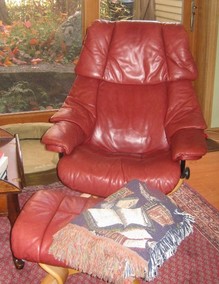Author Interviews
Check out the author interview index HERE.
Interview with Candace Robb
10/19/2015
About the AuthorGrowing up, Candace Robb wanted to be a ballerina, tap dancer, folk singer, journalist—but on the day that she walked into Liz Armstrong’s undergraduate class on Chaucer’s Troilus and Criseyde, that all changed. A gifted teacher, lively, witty, always laughing even when cringing at a lazy response, Dr. Armstrong launched into the opening stanzas, and within a few lines Candace’s ears adjusted to the middle English—and she was hooked. Chaucer’s psychological study of the two lovers was a revelation to her. The next quarter was The Canterbury Tales. That clinched it. Candace went on to graduate work in medieval history and literature, and ever since she’s been engaged in bringing to life the rich culture of the period, from the arts to the politics. She is the internationally acclaimed author of thirteen crime novels featuring the sexy, brooding, clever Owen Archer, who solves crimes for John Thoresby, Archbishop of York and Lord Chancellor of England, and the young Margaret Kerr, searching for her missing husband and her role in a Scotland overrun by English soldiers. Candace is currently under contract with Pegasus Books for a new crime series set in 15th century York, the Kate Clifford mysteries, which will debut in 2016. Writing as Emma Campion, Candace has published two historical novels about the women of the English court in the 14th century, A Triple Knot and The King’s Mistress. Born in the Blue Ridge Mountains of North Carolina, Candace grew up in Cincinnati, Ohio, and has lived most of her adult life in Seattle, Washington, which she loves for its combination of culture, natural beauty, and brooding weather so like Yorkshire, Wales, and Scotland, which she visits as often as possible. She has taught the art of writing the crime novel in the University of Washington’s certificate program, and offers workshops in writing the historical novel and in creating and plotting the crime series. Candace (and Emma) blog about writing and medieval topics at A Writer’s Retreat, ecampion.wordpress.com. The Interview 1. How did you get started as an author? What or whom inspired you? I’ve always been a storyteller. As a child I entertained my mother with convoluted stories that shifted and changed, much as dreams do when we remember them. She enjoyed them, but worried that I might someday forget what was true and what was fiction. As a teenager I wrote songs that were usually modern variations on the Child ballads (Francis James Child, collected in The English and Scottish Popular Ballads), popularized by Joan Baez. At university I began my lifelong, so far futile attempt to write a haunted house novel. I can’t tell you have many I’ve begun and abandoned. My first published novel was The Apothecary Rose. I wanted to bring to life the 14th century that I glimpsed in the poetry of Geoffrey Chaucer. Anya Seton’s Katherine inspired me, and Daphne Du Maurier’s My Cousin Rachel and The House on the Strand. As far as crime writers, I was reading Colin Dexter, PD James, and Martha Grimes to get a sense of how a mystery worked. I especially liked how Grimes injected some humor into the story. When the book sold to St. Martin’s Press I was in York double checking some of the locations. They wanted my assurance that it was the first in a series, so I started researching The Lady Chapel while I was still in the city. Such an exciting time! 2. How many books have you written and in what genres? I’ve published 13 crime novels (all historical mysteries), and 2 historical novels about the women at the court of King Edward III. 3. What writing projects are you currently working on? What can you tell us about these projects? I’m currently working with my editor to polish the first book in a new crime series, The Service of the Dead, a Kate Clifford mystery. And I’m writing the second book in the series. The Kate Clifford mysteries are set in York slightly later than the Owen Archer novels; the conflict between King Richard II and Henry of Lancaster/ Henry IV provides an edgy political climate in which the citizens of York become deeply, and tragically, involved. But the focus is on Kate Clifford, a young widow with a background on the Scottish borders that has prepared her for trouble. She’s handy with knife, axe, and bow. And she’s found a rather unorthodox way to pay off her late husband’s debt—running what might be considered a high-end brothel. I think her Irish wolfhounds, Lille and Ghent, will steal the show. 4. What does your writing process look like? I’ve come to think that the way I write is rather like playing Dungeons and Dragons by myself. I begin with an ensemble of characters, give them powers/social status, skills/professions, personalities (including passions), then I create a crisis and watch them deal with it. It’s so much more fun than when I outlined every chapter and then despaired as my characters resisted all attempts to keep them in line. 5. Where is your favorite place to write? The office my husband built for me out of two small rooms and a short hallway. I look out into a lovely garden, my books surround me, my desk is large, I have a reading chair and space to keep a yoga mat at the ready for unwinding.  6. How important are the names in your novels? How do you choose names for your characters? Do you have any name resources you would suggest? When writing historical novels, much research goes into the names. For fictional characters, I use poll tax lists, wills, and other public records. I spend a long while trying out names for my main characters—they need to feel right. So the research comes first, and then I live with the names, trying them out. For the period in which I write—14th/15th century—the names of male historical figures can become confusing because of the proliferation of Williams, Johns, Edwards…. It’s challenging to devise ways to distinguish them—Earl William vs Will, Edward vs Ned, etc. 7. What authors/novels that you enjoy would you recommend? Such a broad question! How to answer? It’s so difficult recommending books in general—I tend to have quirky taste. But you can’t go wrong with Ursula K LeGuin or Daphne DuMaurier. I love Donna Leon’s characters. This past year I discovered to my delight Robin Hobb’s Farseer Trilogy (her world building is so richly textured, her characters engaging and believable). I’ve featured Patricia Bracewell’s first two novels in a trilogy about Emma of Normandy on my blog: Shadow on the Crown and The Price of Blood (both highly recommend) and Susan Signe Morrison’s Grendel’s Mother (a retelling of Beowulf from the women’s perspective—brilliant!). Chris Nickson writes several excellent historical crime series set in Leeds and he’s written two medieval mysteries, The Crooked Spire and The Saltergate Psalter (which will be published in the new year). 8. Where is your favorite place to read and why? I have a comfortable reading chair in my office that I love because of the light from the garden during the day and the books within easy reach. I also love to read in bed before sleep—doesn’t everyone?!  9. What period of history interests you the most? That’s easy, late medieval (late 13th through the 15th centuries), which is why I write about it. But I love to read fiction set in early 20th century history through WWII—less of a busman’s holiday than reading fiction set in my period of expertise. 10. If you could choose someone famous to star in one of your books made to a movie, who would you choose and for which character? For Christiana, Margaret Kerr’s mother, I can see Michelle Fairley in the part. She plays Catelyn Tully Stark in Game of Thrones. She is a perfect mixture of strength and gentle beauty and yet seem to one who holds secrets—that’s Christiana.  And for Hal, Sam Heughan (Jamie in Outlander) because—well, you can guess why! Though he’d need to go blonde to play Hal, he’s done it before. He can seem at once youthful and powerful, with a quiet strength. That’s Hal. 11. What inspired the idea for the Margaret Kerr Historical Mystery Series? My interest in Scotland in the late 13th century was sparked by research for the 7th Owen Archer novel, A Spy for the Redeemer. It involved some back-story for Lucie’s aunt, Philippa. Dipping into the history of the Scottish Wars of Independence, I was struck by how the people of Scotland suffered under the hands of both the enemy and their own army. Their crops and livestock were burned in order to starve out the invading English. I wanted to write about them. It reminded me of the haunting images in the news of ordinary people trying to go about their lives in the war torn areas today. It all came together around the character of Maggie Kerr: newly married, she thought she’d escaped her dysfunctional family and would now enjoy a normal, respectable life as a prosperous merchant’s wife; but within a short while her husband goes missing. As she searches for him she learns she knew very little of his history or his character. It’s a universal story, isn’t it? The war complicates and darkens it. 12. What other activities do you enjoy when you are not writing? Gardening relaxes me. Long walks inspire me. Yoga unknots me. Check out my reviews of
A TURST BETRAYED THE FIRE IN THE FLINT A CRUEL COURTSHIP 10/22/2015 02:51:51 pm
What a wonderful interview! It's great to see how a master storyteller began in her childhood. And your lovely office looks like the ideal place to wander into new worlds from! Comments are closed.
|
Request an InterviewHello and welcome to my author interview page. Here there will be interviews with some fun and amazing authors. How to comment on the blog due to weird theme issues:
-Name -Website -Comments -Notify me of new comments to this post by email Need to search the site? Use the search engine below...
Follow the author interviews blog via email:
CategoriesArchives
May 2021
|